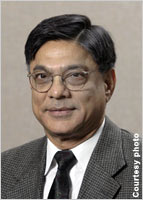
Shahid Ansari is provost and dean of faculty at Babson College. He specializes in behavioral and cultural aspects of management accounting, strategy, control, and change management.

Nurlan Kapparov
The biggest challenge I see is the lack of professional human resources. We struggle to find the right people to move on with different projects.
We have a very high literacy rate in Kazakhstan, and our population in general is very well educated, because we came out of the strong Soviet education system.
But in the business life, we have a different system. There are not so many local entrepreneurs who speak English, who have a business education, who understand the importance of working transparently and are efficient.
That’s why we invite a lot of ex-pats to work with our country. We would like to rely on our local human resources, but people want more pay than what they can deliver in work. You can get much better, higher-level professionals from outside – people ready to work on less than what our local people want to earn.
Another thing with which we are struggling is the lack of funding [bank financing]. Funding became extremely expensive in the last two years. Our banks have raised interest rates dramatically, to 14, 15 percent per annum. Normal projects cannot survive. The government is encouraging entrepreneurs to participate in the diversification of our economy, but with expensive funding, it is going to be difficult.
Many people are scared of the entrepreneurs; they would rather stay with companies that take care of them. If you have the entrepreneurial spirit inside yourself, you might try to start a business. Many times it will not be successful in the beginning. But small achievements will start to create confidence.
My advice is to be careful with people and build trust in people slowly. Don’t believe that because you’re exceptional, you will get this opportunity or deal or customer.
Another lesson I have learned and could pass on is this: If you have negotiations and you are stuck, try to make the pie bigger so there’s food enough for everybody.

Shahid Ansari
You focus fairly heavily on the lack of funding and the lack of financial resources. Financial resources are merely one of several things an entrepreneurial ecosystem needs. You need a support system where entrepreneurs can link with each other, a system of “angel investors” to bypass the system of structured finance, a network of education and training materials that cut across from grade school to adults running small and medium enterprises.
The other idea you’re talking about is a cultural idea: attitudes toward risk and failure. The key here is to understand that the traditional notion of an entrepreneur as a “swashbuckling risk-taker” is not correct. Entrepreneurs are actually quite risk averse. They tend to make their decisions based on how much they can afford to lose rather than how much they stand to gain.
One has to make it safe for entrepreneurs to fail. We train our students to start a business and close it down within the first year of college. They learn very quickly that entrepreneurship is about acceptance of failure. They learn to redefine “failure” as “learning opportunities.” They pick up and move on. It’s not always about finding an opportunity but making an opportunity.
Particularly in Muslim countries, the historical context of Islamic entrepreneurship was rooted in trading and caravans. People went and traded goods and distributed profits. If they failed in this venture they never came back because they had let down investors. That’s why a lot of cultures, particularly in Islamic countries, do not separate the failure of a venture from the failure of an individual. The phrase “serial entrepreneurship” doesn’t enter into their lexicon. In the U.S., we understand that individual ventures an entrepreneur may undertake may fail, but that doesn’t mean the failure of the individual.
